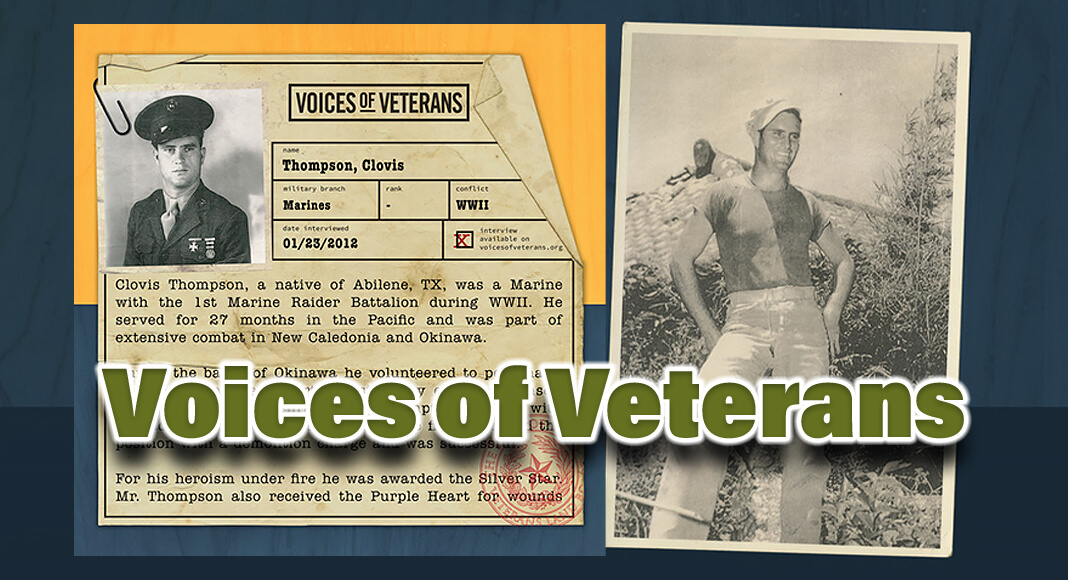
Texas Border Business
AUSTIN – Texas Land Commissioner and Veterans Land Board (VLB) Chairwoman Dawn Buckingham, M.D., is proud to introduce the next installment of the series highlighting the VLB’s Voices of Veterans oral history program. This week, we highlight the service of Clovis Thompson who served in the U.S. Marines during WWII.
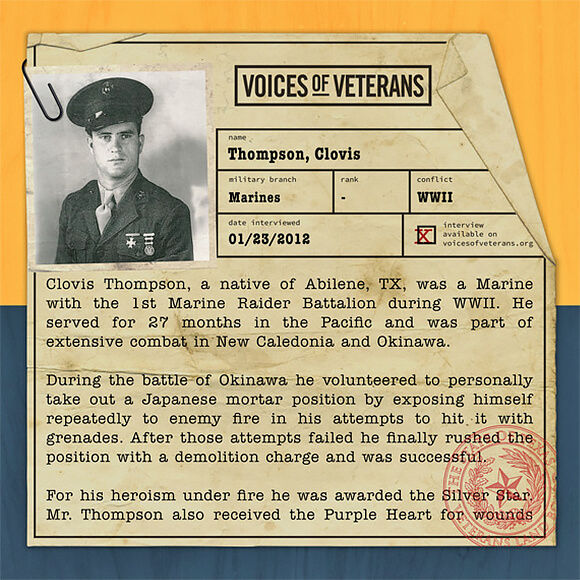
Thompson was born and raised in Paducah, Texas on a 320-acre farm with seven brothers and sisters. After graduating from Valley View Rural High School, Thompson moved to Lubbock started roofing with Lideck Roofing Company in 1941 before deciding to join the Corps. The first in his immediate family to go into the military, Thompson remembers Pearl Harbor vividly.
“I roofed that day for Lideck Roofing Company,” he said. “I roofed the Lubbock Air
Force Base in Lubbock that day and I heard about it when I got off that afternoon, it was on the radio.”
Thompson said he didn’t consider entering the military, even after the attack on Pearl Harbor but after some thought and as the war progressed, he entered into The Marine Corps in November 1942.
“A little story behind that is the fact that I went to the courthouse there in Wichita to join, but I did not for some reason or another, I did not want to go into the Army, so I decided I’d go to the Navy,” he explained. “I went to the courthouse there in Wichita and went upstairs and volunteered for the Navy, and my brother had dropped me off and was gonna pick me up later, so I kind of was setting out on the steps of the courthouse in Wichita having already signed up for the Navy that they were gonna call me later, and I saw this big Marine sign which of course were all over the country at that time, you know, and I said well, I might not mind being in that outfit. So I went back upstairs and went into and volunteered for the Marine Corps.”
Thompson said he was told the Marines would call him in a couple weeks but he told them he didn’t want to wait and instead he wanted to get going right away.
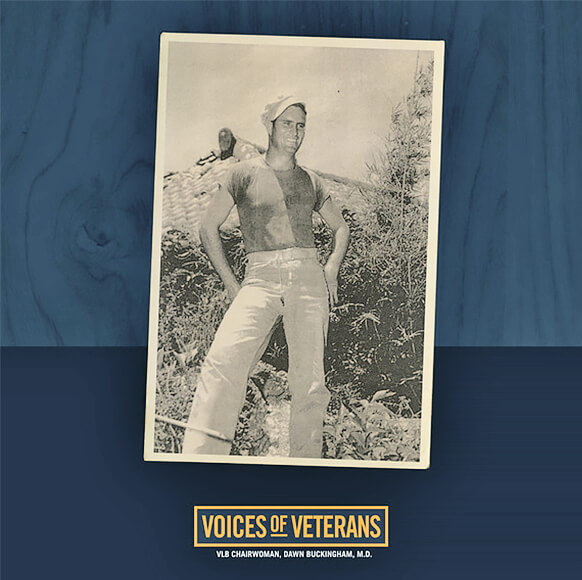
“I reached in my pocket and pulled out my Navy papers and said if you don’t take me, the Navy will, and if they don’t take me, the Army will. So I said I’m ready to go,” Thompson said about the conversation in the courthouse. “The old boy looked at me a minute and he picked up the phone and called somebody and he told somebody on the phone, he says, ‘I’ve got a man here off the farm drove tractors and so and so, we need him and he wants to go now.’ And he hung up the phone and says be here in the morning at eight o’clock.”
Thompson said he went to boot camp at the Marine Corps Recruit Depot in San Diego where he would spend the next six weeks and upon his graduation, he volunteered for the Tank Corps because of his experience driving tractors back home. From the Training Depot, Thompson was sent to Jack’s Farm, a few miles north of San Diego where he spent another six weeks.
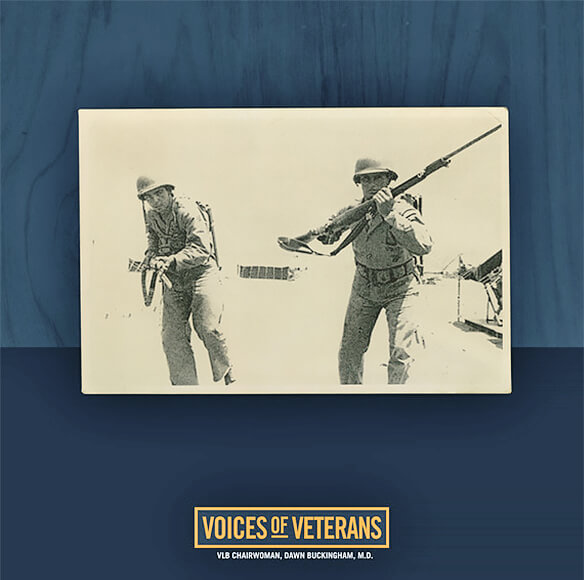
“They brought some new tanks out, and by then I had become a driver of a tank, and I drove one of the first automatic transmissions that was ever devised. They put ‘em on some tanks and they brought us some tanks with automatic transmissions for us to try ‘em out,” Thompson explained. “So I had one of those tanks, and I drove one of those tanks out in the sand dunes there north of San Diego. We bogged ‘em down, burned up those transmissions real quick out in that sand, and we said nope, they won’t do and we sent ‘em back.”
Thompson’s military career took a turn when he refused an order to continue, what he felt, was the same tank training for an additional six weeks. As he tells it, he was a bit of a hot head in those days, and his refusal led him to the 1st Marine Raider Battalion.
“After about the second or third day, they come down, the drill instructor and a couple of Marine sentries with the M-1 rifles, and hollered ‘Thompson, fall out.’ I come out of my tent and they said get your gear, pack up,” he explained about that time. “I got my gear and they put me on a Jeep and we went eight miles back into San Diego back to recruit depot, and they just come up in front of the barracks and kicked me out and said go upstairs, that’s where everybody was. So, I volunteered then to go with the 1st Marine Raider Battalion.”
Thompson recalled a sequence of events near Sugar Loaf Hill, events he said would later award him a Silver Star for his heroic actions on Okinawa.
“We were fixin’ to move up one morning and as the intelligence called in cover, from the ships, they were going to throw shells and they would shell the area in front of us supposedly,” he explained. “Well this particular day, this morning, they put those shells right into our area as we were going and we lost a bunch of men there. So we had friendly fire I guess would be the saying.”
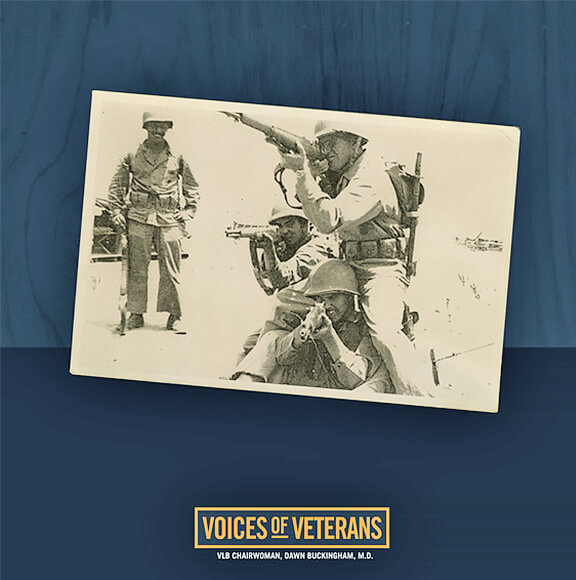
What happened next, Thompson recalled, decimated his platoon as multiple casualties began to pile up as the enemy continued to fire knee-mortars their way. As he puts it, he knew if something wasn’t done, all of them would be killed.
“I said get the machine guns up here. So he called back and got a couple of machine guns up there, and they put them and they would give cover and I told ‘em I’ll go down there and get a good aim in there and see if I can knock that out,” Thompson said about his plan to take out the enemy and before he rushed the enemy under the cover of machine gun fire from high.
Thompson said he threw five grenades but didn’t have the success he was hoping for and knew in order to save himself and everyone else, he needed to light them up with force and that’s when he turned to his Lieutenant Chester D. Brown and told him he needed three dynamite sticks with a five second fuse.
“That’s what he did, he fixed me up with a dynamite charge with a fuse on it, lit it, and I took off down there and threw it in the hole, and pretty close to the time I threw that in the hole, of course it went off, and we had, I use the word a landslide, all those hills where that hole was caves, and with this dynamite charge I caved in several areas, a pretty big area, and as I was trying to get back to my position, I called the word we had a landslide, and you never saw two little old legs run so hard in your life trying to get up that hill and get out of that area,” Thompson said. “Anyhow, I did knock out the enemy and that’s what I got a Silver Star for.”
Information source: Texas General Land Office














